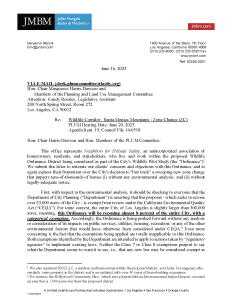JMBM is pleased to announce that Daniel Freedman, a distinguished partner in JMBM’s Government Land Use and Energy department and co-chair of the firms Housing Strategy and Litigation Group, has been chosen as an adjunct professor for the UCLA Luskin School of Public Affairs Urban Planning graduate program. This prestigious appointment highlights his exceptional expertise at the intersection of law and urban planning. Daniel has also served as an adjunct professor in the graduate urban planning program for California State University Northridge.
Being selected to teach at one of the nation’s premier institutions is a testament to Daniel’s deep understanding and impact in the field, as well as to his dedication to advancing knowledge in law and its application to the most complex challenges facing today’s city and regional planning professionals. His passion and insights will enrich the learning experience for students and elevate the discourse surrounding land use and city planning.
“As graduate from UCLA’s urban planning Masters program, I understand the significance of this curriculum for the students, as well our regional institutions,” said Daniel. “I look forward to contributing to the program and helping our future planning professionals develop a nuanced perspective of how the law continues to shape our urban environment.” Continue reading




